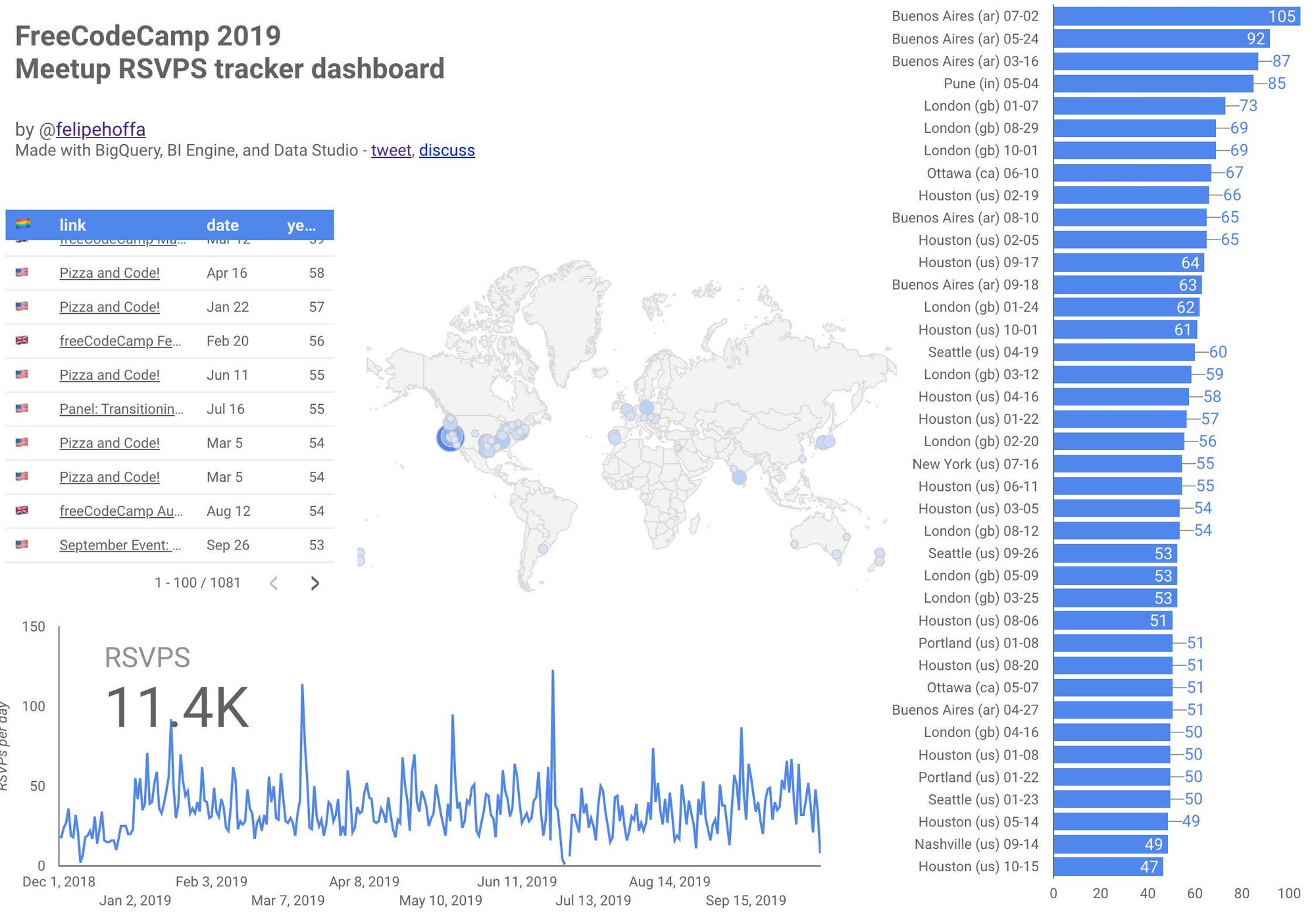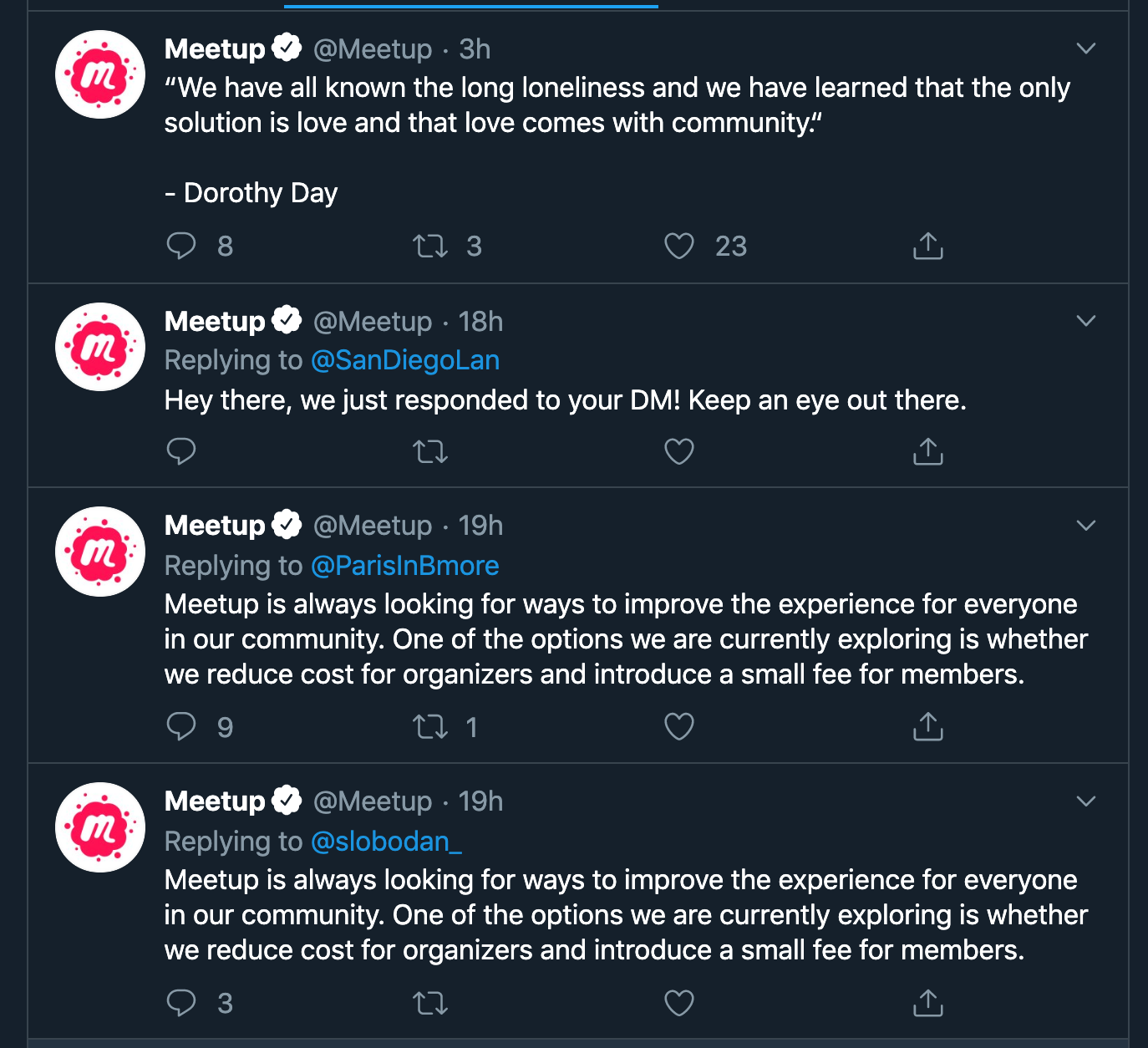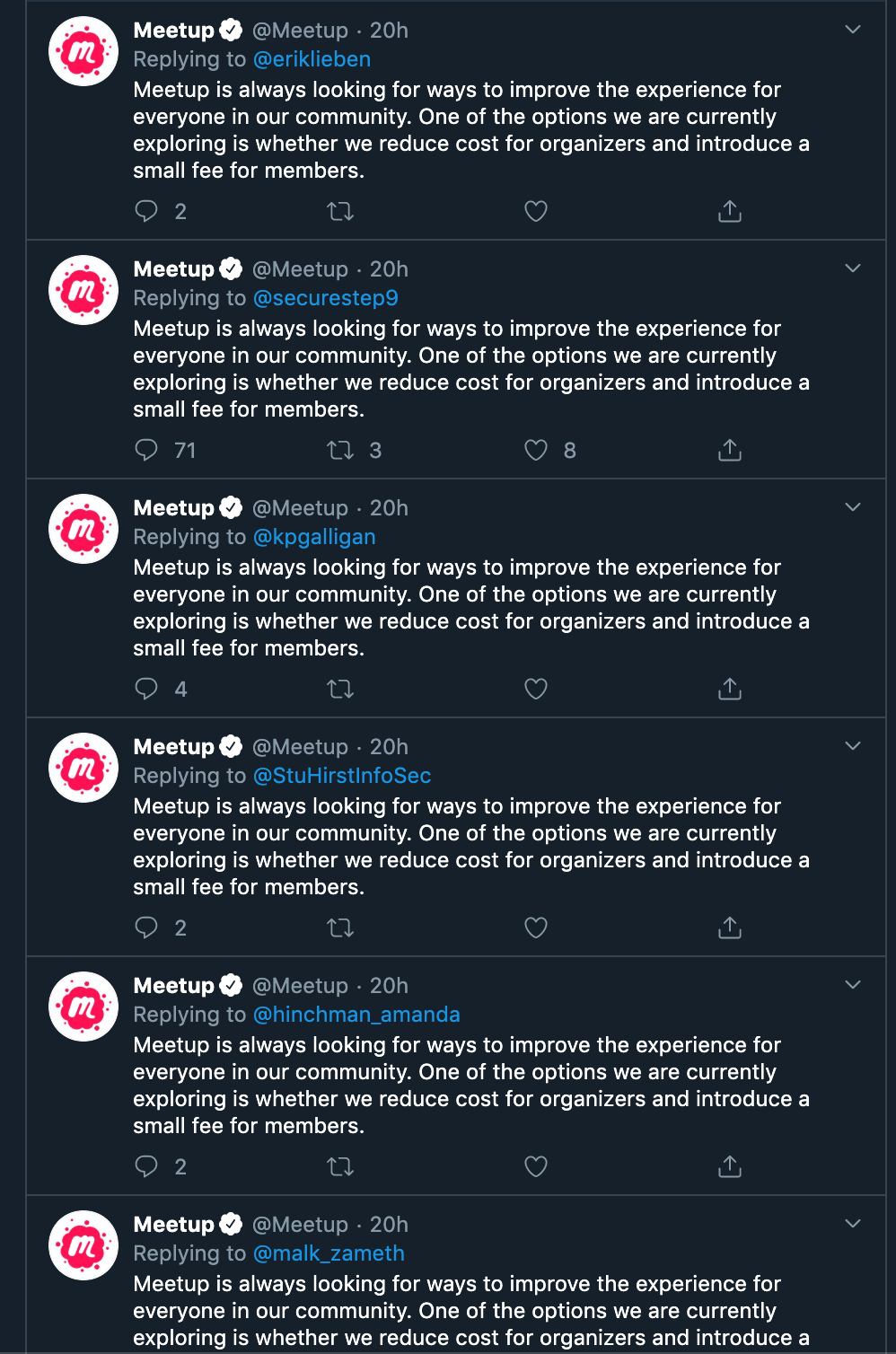Update: A few hours after I published this article, Meetup quietly added a note to the top of their announcement. They have not tweeted or done anything else to publicize this note, but some people noticed it and shared it with me.
Here's what it says:
"UPDATE October 15, 2019 1:30 pm ET: This payment change is currently only a limited test for a small number of groups. Organizers of these select groups have the option to opt-out of this test. We will not be making any significant payment changes in the near term. We are committed to providing advance notice before any changes go into effect."
They have bowed to the backlash. Now that their "flash-fry the frog" approach has failed, they are now going to "boil the frog" and roll out these changes over time. Meetup has not tweeted or otherwise alerted organizers of this pull-back.
This is a victory for event organizers and participants. But it's a temporary one. Meetup has already shown their true colors. It's just a matter of time before they start pushing this new RSVP-based pricing on more of their communities.
To be 100% clear: the freeCodeCamp.org community is still hard at work on an open source alternative to Meetup, and we are making steady progress.
(End update.)
Last night Meetup.com quietly rolled out a new pricing structure.
Effective "October", Meetup is reducing the amount of money event organizers have to pay each month from $20 per month to $2 a month.
Wow - that sounds great. Group organizers don't have to pay as much? So why is everyone so mad?
Well, Meetup is also adding a new $2 fee every time a person RSVPs for a meetup. Every. Single. Time.
Let's do some quick math. Before, it cost a group of people $20 per month to use Meetup.com to organize their events.
With this new pricing, let's assume you have a medium-sized meetup group that meets once a week and has 30 RSVPs each time.
The group's total collective Meetup.com fees will now go from $20 per month to:
($2 * 30 RSVPs * 4 events per month) = $240
Oh, wait - I forgot to add that Meetup.com will still charge group organizers $2 per month on top of this. So $242.
That's a 1,210% increase in cost.
Here's some more math.
Felipe Hoffa created this visualization to show how Meetup's new RSVP-based pricing would affect freeCodeCamp and its dozens of meetup groups around the world:

We've had 8,600 RSVPs for freeCodeCamp events so far in 2019. That would translate to:
(11,400 RSVPs * $2) = $22,800 in Meetup.com feesSorry, Meetup.com. Your software platform is not worth $22,800 per year to our nonprofit and its community of study groups.
Up until now, most meetups have been completely free. Meetup has the option of charging people to attend, but very few meetups use this feature.
We have over 150 attendees per month @Dallas_Hackers . We often have over 100 RSVPs. We don't charge for the event. The organizers pay the $12 a month out of pocket.
— Tinker (@TinkerSec) October 14, 2019
If you charge more, we'll just drop from your service and use the myriad of other ways to announce.
A 2017 estimate put the total number of Meetup groups at 225,000.
This pricing change will destroy thousands of communities on meetup.com - many of which have existed for more than a decade.
Why is Meetup.com making such a flagrant cash grab? Because of the WeWork IPO Debacle.
WeWork bought Meetup.com in 2017 for an estimated $200 million.
And if you haven't heard, WeWork is in a lot of trouble. Last month their big IPO imploded.
WeWork CEO Adam Neumann resigned after taking $700 million out of the company and doing super sketchy things like buying buildings in his own name, then leasing the buildings to his company.
WeWork could run out of cash by November. So they are desperate to get cash any way they can. Which explains Meetup.com's sudden, dramatic price change.
So how has Meetup.com been handling this PR crisis? Well, they replied to some people using the same exact canned response. Then they just stopped responding. And now they're tweeting motivational quotes.


Meetup doesn't care.
They have crunched the numbers.
They know that a certain percentage of hobby groups and fitness groups - and maybe even a few big business or tech groups - will shrug and say "I guess people will just have to pay a fee now."
If even 10% of Meetup.com groups stay on their platform, they will end up making significantly more money than they are now.
At this point, Meetup.com doesn't care about sustainability. Its parent company, WeWork, could go into bankruptcy proceedings any day now.
That's an odd way of phrasing "Meetup is owned by a bunch of scam artists (@WeWork) who've pissed the venture capitalists' money up the wall and so we desperately need to gouge the community"!
— Jack Allnutt (@allnutt_eu) October 14, 2019
This should just be yet another parable of corporate greed ruining a platform.
But this is more tragic. Much, much more tragic.
Because there are thousands of group leaders who have built up their communities on Meetup.com.
This isn't a slow-motion dying off, like with Tumblr or Geocities. This is all happening suddenly, and out of the blue.
Meetup is a huge platform. And its owners - out in the cold - have decided to set Meetup.com on fire so they themselves can stay warm a little bit longer.
What options do groups have?
There is no way any of the communities I manage (4000 members in 4 groups) will pay $2 per RVSP. We will replace you @Meetup.
— Dimitris Tsapakidis (@Dimitris) October 15, 2019
The sad truth is there aren't many good alternatives for Meetup.com refugees.
If you create a group on Meetup.com, you will automatically get some amount of exposure - both from Google search and from Meetup's own internal recommendation engine.
Meetup has "network effects". As it becomes bigger, it becomes more useful. And more entrenched. Not unlike Facebook, Google, Amazon, or any other platform company.
Meetup.com benefits from network effects. Heck, they trademarked the common English expression "meetup" so nobody else can even use it.
I've spent the past 2 years looking for a good alternative for the dozens of freeCodeCamp study groups that are hosted on Meetup.com.
There are only two platforms that can give your group and your events comparable exposure: Facebook and Eventbrite.
Facebook has a "Groups" functionality that allows you to create events and allows people in your group to RSVP for them. It's free. And most people already have a Facebook account, even though fewer people use Facebook these days.
The problem with Facebook is it's hard to actually reach people - even inside your own Facebook group. You could have thousands of people in your Facebook group and only a few hundred of them will see your event when you post it.
You can of course pay Facebook to advertise your event. That's probably way cheaper than using Meetup.
Eventbrite is good, and is free for free events. It is less useful for groups with regular events.
And there are several functional clones of meetup.com as well - some of which are open source.
But none of these have much critical mass. Most of them are littered with groups created by people who were just tinkering, and events rarely get RSVPs - let alone actually happen.
The fundamental problem with these platforms is they aren't associated with any specific organization. They don't have a specific stakeholder raising awareness of the events.
These are big, general social network-like tools where anyone can create any type of event and make it public to everyone.
The good news is I've spent the past two years thinking about this problem. And there's a way we can get organizations onboard to bring their own networks.
A Better Way Forward: Self-Hosted Chapters
The solution is to let every organization host their own "Meetup.com in a box."
They can house this on their own servers. They can host this on their own website. And they can steer their own existing community to their own chapters' events.
This will give each organization full ownership and full control over their data. It will also let them configure the tool however best suits their chapters.
Organizations will no longer need to rely on a Meetup's big centralized directory of disparate groups and events. Instead, they can focus on growing their own audiences, boosting their own local SEO, and building their own event mailing lists.
freeCodeCamp is a donor-supported nonprofit. For the past 5 years, dozens of our local chapters have paid Meetup the $20 per month fee - totaling $10,000s of volunteers' money.
We have a Meetup problem. And we are building a solution for it. It's called Chapter.
freeCodeCamp is building an open source alternative to Meetup.
— Quincy Larson (@ossia) October 14, 2019
- No fees for organizers
- No fees for participants
People have been asking us for a free event tool for years.
Now Meetup's new pricing scheme is forcing our hand.
Let's build it together: https://t.co/1Po1I5l8C2 pic.twitter.com/WjIS8J8z2u
Your organization will be able to use this solution, too. For free.
We started working on this last night in response to Meetup.com's announcement. And we're working as fast as we can to get this tool ready for you.
You can read more about this on the GitHub repository.
If you are an event organizer, or a nonprofit with a lot of chapters, know this: help is on the way.
This will be much better suited to your needs than Meetup was previously. And it will be free and fully under your own control.

